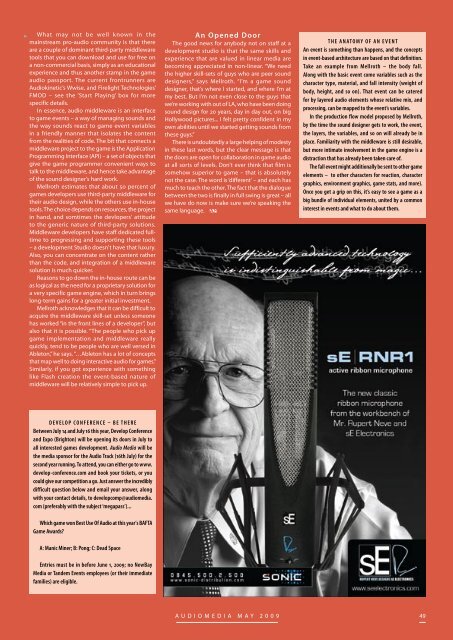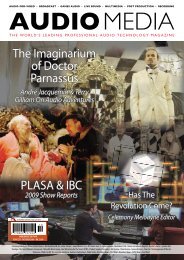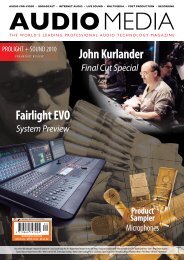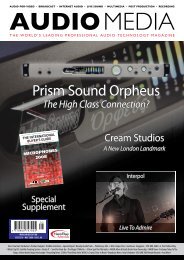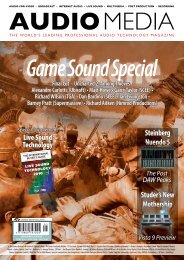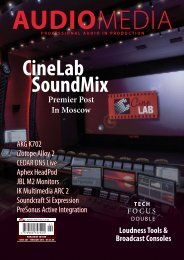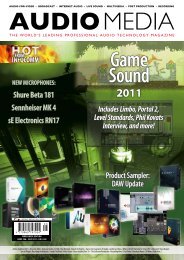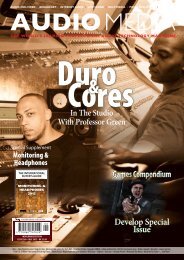Renew Your Audio Media Subscription for 2009!
Renew Your Audio Media Subscription for 2009!
Renew Your Audio Media Subscription for 2009!
Create successful ePaper yourself
Turn your PDF publications into a flip-book with our unique Google optimized e-Paper software.
�<br />
What may not be well known in the<br />
mainstream pro-audio community is that there<br />
are a couple of dominant third-party middleware<br />
tools that you can download and use <strong>for</strong> free on<br />
a non-commercial basis, simply as an educational<br />
experience and thus another stamp in the game<br />
audio passport. The current frontrunners are<br />
<strong>Audio</strong>kinetic’s Wwise, and Firelight Technologies’<br />
FMOD – see the ‘Start Playing’ box <strong>for</strong> more<br />
specific details.<br />
In essence, audio middleware is an interface<br />
to game events – a way of managing sounds and<br />
the way sounds react to game event variables<br />
in a friendly manner that isolates the content<br />
from the realities of code. The bit that connects a<br />
middleware project to the game is the Application<br />
Programming Interface (API) – a set of objects that<br />
give the game programmer convenient ways to<br />
talk to the middleware, and hence take advantage<br />
of the sound designer’s hard work.<br />
Mellroth estimates that about 50 percent of<br />
games developers use third-party middleware <strong>for</strong><br />
their audio design, while the others use in-house<br />
tools. The choice depends on resources, the project<br />
in hand, and somtimes the devlopers' attitude<br />
to the generic nature of third-party solutions.<br />
Middleware developers have staff dedicated fulltime<br />
to progressing and supporting these tools<br />
– a development Studio doesn't have that luxury.<br />
Also, you can concentrate on the content rather<br />
than the code, and integration of a middleware<br />
solution is much quicker.<br />
Reasons to go down the in-house route can be<br />
as logical as the need <strong>for</strong> a proprietary solution <strong>for</strong><br />
a very specific game engine, which in turn brings<br />
long-term gains <strong>for</strong> a greater initial investment.<br />
Mellroth acknowledges that it can be difficult to<br />
acquire the middleware skill-set unless someone<br />
has worked “in the front lines of a developer”, but<br />
also that it is possible. “The people who pick up<br />
game implementation and middleware really<br />
quickly, tend to be people who are well versed in<br />
Ableton,” he says. “…Ableton has a lot of concepts<br />
that map well to doing interactive audio <strong>for</strong> games.”<br />
Similarly, if you got experience with something<br />
like Flash creation the event-based nature of<br />
middleware will be relatively simple to pick up.<br />
DEVELOP CONFERENCE – BE THERE<br />
Between July 14 and July 16 this year, Develop Conference<br />
and Expo (Brighton) will be opening its doors in July to<br />
all interested games development. <strong>Audio</strong> <strong>Media</strong> will be<br />
the media sponsor <strong>for</strong> the <strong>Audio</strong> Track (16th July) <strong>for</strong> the<br />
second year running. To attend, you can either go to www.<br />
develop-conference.com and book your tickets, or you<br />
could give our competition a go. Just answer the incredibly<br />
difficult question below and email your answer, along<br />
with your contact details, to developcomp@audiomedia.<br />
com (preferably with the subject ‘megapass’)...<br />
Which game won Best Use Of <strong>Audio</strong> at this year’s BAFTA<br />
Game Awards?<br />
A: Manic Miner; B: Pong; C: Dead Space<br />
Entries must be in be<strong>for</strong>e June 1, <strong>2009</strong>; no NewBay<br />
<strong>Media</strong> or Tandem Events employees (or their immediate<br />
families) are eligible.<br />
An Opened Door<br />
The good news <strong>for</strong> anybody not on staff at a<br />
development studio is that the same skills and<br />
experience that are valued in linear media are<br />
becoming appreciated in non-linear. “We need<br />
the higher skill-sets of guys who are peer sound<br />
designers,” says Mellroth. “I’m a game sound<br />
designer, that’s where I started, and where I’m at<br />
my best. But I’m not even close to the guys that<br />
we’re working with out of LA, who have been doing<br />
sound design <strong>for</strong> 20 years, day in day out, on big<br />
Hollywood pictures... I felt pretty confident in my<br />
own abilities until we started getting sounds from<br />
these guys.”<br />
There is undoubtedly a large helping of modesty<br />
in these last words, but the clear message is that<br />
the doors are open <strong>for</strong> collaboration in game audio<br />
at all sorts of levels. Don’t ever think that film is<br />
somehow superior to game – that is absolutely<br />
not the case. The word is ‘different’ – and each has<br />
much to teach the other. The fact that the dialogue<br />
between the two is finally in full swing is great – all<br />
we have do now is make sure we’re speaking the<br />
same language. �<br />
THE ANATOMY OF AN EVENT<br />
An event is something than happens, and the concepts<br />
in event-based architecture are based on that definition.<br />
Take an example from Mellroth – the body fall.<br />
Along with the basic event come variables such as the<br />
character type, material, and fall intensity (weight of<br />
body, height, and so on). That event can be catered<br />
<strong>for</strong> by layered audio elements whose relative mix, and<br />
processing, can be mapped to the event’s variables.<br />
In the production flow model proposed by Mellroth,<br />
by the time the sound designer gets to work, the event,<br />
the layers, the variables, and so on will already be in<br />
place. Familiarity with the middleware is still desirable,<br />
but more intimate involvement in the game engine is a<br />
distraction that has already been taken care of.<br />
The fall event might additionally be sent to other game<br />
elements – to other characters <strong>for</strong> reaction, character<br />
graphics, environment graphics, game stats, and more).<br />
Once you get a grip on this, it’s easy to see a game as a<br />
big bundle of individual elements, united by a common<br />
interest in events and what to do about them.<br />
AUDIOMEDIA MAY <strong>2009</strong> 49


